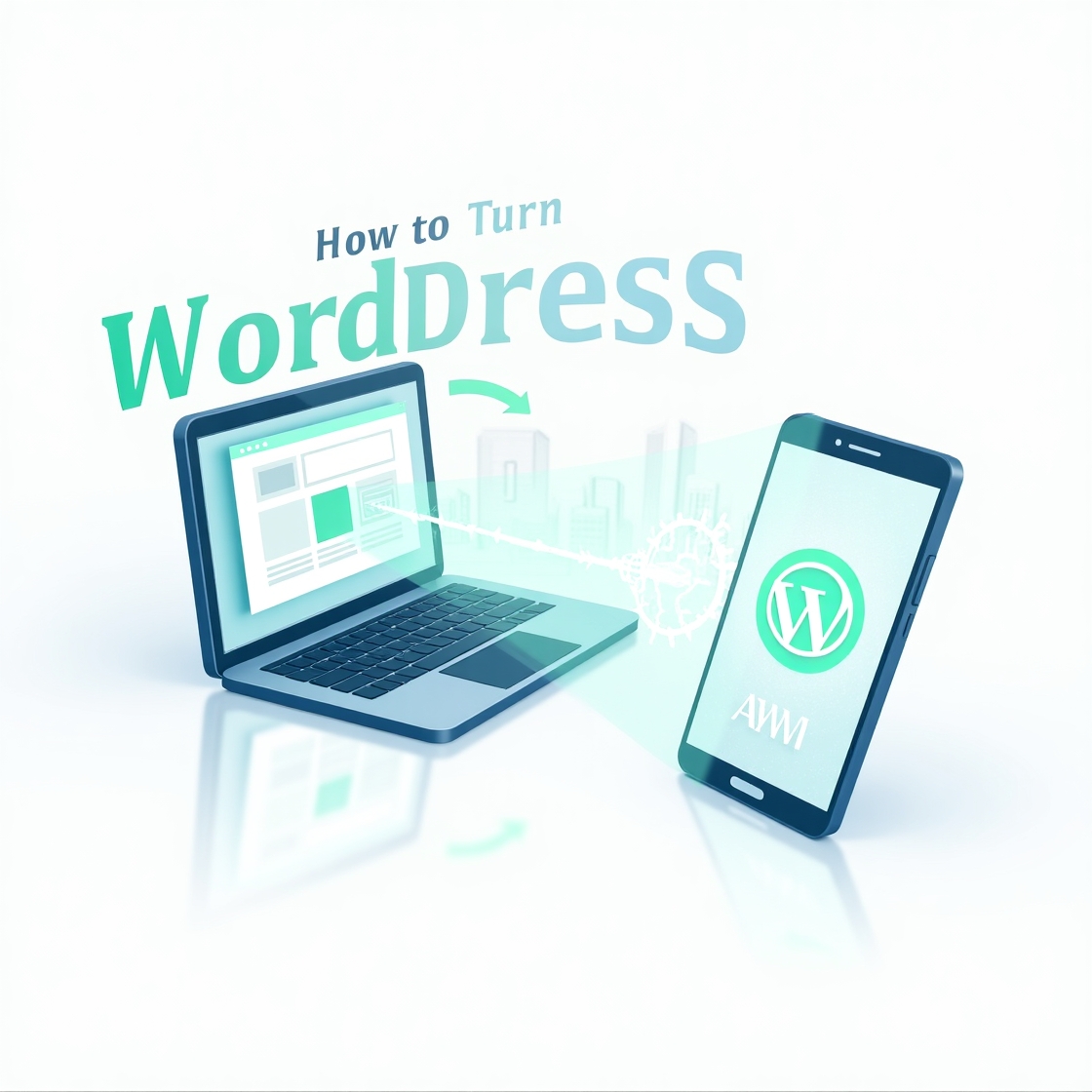How to Turn WordPress into a Mobile App: The Complete Guide
In today’s mobile-first world, having a native app version of your WordPress website can dramatically improve user engagement, increase retention rates, and boost conversions. This comprehensive guide will walk you through all the methods to transform your WordPress site into a fully functional mobile app, whether you’re a beginner or an advanced user.
Why Convert Your WordPress Site to a Mobile App?
Before diving into the how-to, let’s examine why you should consider app-enabling your WordPress site:
- Enhanced User Experience: Native apps provide smoother navigation and faster load times
- Increased Engagement: Push notifications can boost repeat visits by up to 88%
- Offline Accessibility: Content can be made available without internet connection
- App Store Visibility: Gain exposure through Google Play and Apple App Store
- Monetization Opportunities: Additional revenue streams through in-app purchases
Method 1: Using App Builder Plugins (Easiest Solution)
Recommended Plugins:
AppPresser
Connects directly to your WordPress site
Uses Ionic framework for hybrid apps
Customizable themes and push notifications
Pricing starts at $19/month
WPMobile.App
One-click conversion to Android/iOS
Automatic content synchronization
Includes monetization features
Free version available
AndroApp
Specifically for Android apps
Simple configuration
Ad integration options
Lifetime license available
Pros of Plugin Method:
- No coding required
- Quick setup (often under 1 hour)
- Affordable compared to custom development
Cons:
- Limited customization options
- May have recurring fees
- Performance not as optimized as native apps
Method 2: Progressive Web Apps (PWA) – The Modern Alternative
How to Implement PWA for WordPress:
Install a PWA plugin like:
SuperPWA
PWA for WP
WordPress Mobile Pack
Configure manifest.json file:
App name
Icons
Splash screen
Color scheme
Enable service workers for:
Offline functionality
Background sync
Push notifications
Advantages of PWA Approach:
- No app store submission needed
- Works across all devices
- Lower development cost
- Easier to update
Disadvantages:
- Limited access to device features
- Not discoverable in app stores
- iOS support isn’t as robust
Method 3: Hybrid App Frameworks (For Developers)
Popular Frameworks:
React Native
- Learn once, write anywhere
- Near-native performance
- Large developer community
Flutter
- Beautiful UI components
- Fast rendering
- Growing ecosystem
Ionic
- Web technology based
- Extensive plugin library
- Angular integration
Development Process:
- Set up WordPress REST API
- Design app interface
- Connect to WordPress backend
- Implement authentication
- Add native features (camera, GPS, etc.)
Method 4: Full Native App Development
When to Choose Native:
- You need maximum performance
- Your app requires complex animations
- You must access all device features
- You have substantial budget ($10,000+)
Development Options:
- Hire an app development agency
- Use platforms like Upwork to find developers
- Consider app development students for lower costs. need more info? our YouTube channel; https://www.youtube.com/@easythemestore
Key Features to Include in Your WordPress App
User Authentication
WordPress login integration
Social media login options
Biometric authentication
Content Synchronization
Automatic updates
Offline reading mode
Media caching
Push Notifications
New content alerts
Personalized messages
Scheduled notifications
Monetization Options
In-app purchases
Subscription models
Native advertising
Cost Comparison of Different Methods
| Method | Cost Range | Time Required | Skill Level |
|---|---|---|---|
| App Builder Plugins | $0-$500/year | 1-5 hours | Beginner |
| PWA | $0-$300 | 2-10 hours | Intermediate |
| Hybrid Frameworks | $500-$5,000 | 20-100 hours | Advanced |
| Native Development | $5,000-$50,000+ | 3-12 months | Professional |
Step-by-Step Guide Using AppPresser (Most Popular Method)
Install AppPresser Plugin
Download from WordPress repository
Activate on your site
Connect to AppPresser Service
Create account at apppresser.com
Get API key and enter in plugin settings
Customize Your App
Choose color scheme
Upload logo
Select navigation style
Add WordPress Features
Enable posts/pages
Configure WooCommerce if needed
Set up user accounts
Build and Publish
Generate app package
Submit to app stores
Manage updates through WordPress
App Store Submission Tips
Apple App Store Requirements
Unique, valuable functionality
Proper metadata and keywords
Compliance with all guidelines
$99/year developer fee
Google Play Requirements
Appropriate content rating
Privacy policy
$25 one-time developer fee
Common Rejection Reasons
Broken links
Poor performance
Copyright issues
Incomplete information
Maintaining Your WordPress App
Regular Updates
Keep both WordPress and app updated
Test new versions thoroughly
Performance Monitoring
Track crash reports
Monitor load times
Analyze user behavior
User Feedback
Respond to app store reviews
Implement feature requests
Fix reported bugs quickly
Advanced Tips for Better Results
App-Specific Content
Create content just for app users
Offer exclusive deals or early access
Deep Linking
Connect web and app experiences
Handle external links properly
Analytics Integration
Track user engagement
Measure conversion funnels
Identify popular features
Troubleshooting Common Issues
Connection Problems
Check REST API is enabled
Verify authentication keys
Test with different networks
Performance Issues
Optimize images
Implement caching
Reduce external requests
Content Sync Failures
Check for plugin conflicts
Verify cron jobs are running
Test with default theme
Final Recommendation
For most WordPress site owners, using a dedicated app builder plugin like AppPresser offers the best balance between functionality, cost, and ease of use. If you’re comfortable with more technical solutions, creating a Progressive Web App provides excellent results without app store dependencies.
Remember that converting your WordPress site to an app isn’t an end goal – it’s the beginning of a new channel to engage with your audience. Plan for ongoing maintenance, updates, and marketing to make your app successful.
Ready to get started? Choose the method that best fits your needs and budget, and begin transforming your WordPress site into a powerful mobile experience today!


